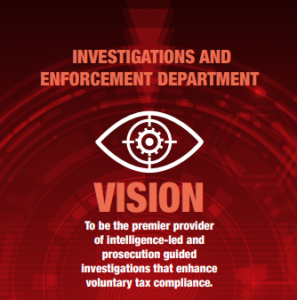KRA TAX Investigations (Investigation and enforcement)

Investigation and enforcement
Investigation and enforcement or Tax investigations involve inquiries into the tax affairs of a taxpayer where the Commissioner has reasonable cause to believe that a taxpayer is involved in tax evasion and violation of revenue laws
Once investigations commence, the Department obtains the facts and evidence needed to establish the elements of criminal activity with a view to prosecuting the perpetrators and recover the taxes.
Investigative techniques used, include conducting interviews, obtaining third party information, conducting surveillance, recording witness statements, executing search warrants, intercepting, seizing and detention of goods where taxes have not been paid, counterfeit, prohibited or restricted goods.
The primary focus is to gather admissible evidence to support prosecution and conviction of the tax offenders and or recovery of taxes. It is noteworthy that prosecution is not a bar to collection of taxes. Issuance of assessments and collection of taxes is an integral component of investigations.
Investigations can be initiated from information obtained through intelligence gathering mechanisms, informers, KRA systems, referrals from other agencies, media as well as from other ongoing investigations
. 5.4 Length of Investigation
The length of investigation depends on the scope of investigation, complexity of the issues and the level of the taxpayer’s cooperation during the investigation. For simple cases, an investigation will take up to 6 months to complete. However, depending on circumstances of each case, investigation might take longer to complete.
5.5 Sources of Information
Investigations can be initiated from information obtained through intelligence gathering mechanisms, informers, KRA systems, referrals from other agencies, media as well as from other ongoing investigations.
5.1 Laws relied upon In order to realize IED’s mandate, the Department administers the following laws: • the Tax Procedures Act 2015, the Income Tax Act (Cap. 470);
- The Excise Duty Act (No. 23 of 2015); • the East African Community Customs Management Act (EACCMA) 2004;
- The Value Added Tax Act (No. 35 of 2013) among others. In the performance of its mandate, IED is guided by the relevant provisions of the Constitution of Kenya, 2010. 5.2 Scope of investigations
The investigations may cover issues on Income tax (individuals or body Corporates), VAT, Customs duty, excise, PAYE, Withholding and other taxes administered by the KRA. The investigation aims to uncover the full facts to determine whether tax offences have been committed. The scope will therefore cover individual taxpayers, all the associated companies, directors, beneficiaries and assets
OBJECTIVES OF TAX INVESTIGATIONS
The objectives are to undertake tax investigation activities aimed at
Detection (Done through interviews, surveillance, execution of search warrants, analysis of financials, review of taxpayer records, and obtaining of third-party information).
Disruption (aimed at identifying tax evasion schemes and dismantling the cartels and all the players involved in such schemes including the perpetrators, professional enablers, the system used, collaborators and facilitators among others.
Some of the enforcement measures includes; Issuance of departure prohibition orders, preservation of funds, asset caveats and preservation, issuance of agency notices, cancellation of TCCs, deactivation of PINS, revocation of customs agent’s licences, continuous surveillance, arrest and prosecution of offenders).
Deterrence (against tax evasion and other fraudulent activities to ensure compliance through prosecution, imposition of penalties, taxpayer education and awareness as well as media publicity among others) o Enhancing compliance (through unearthing emerging evasion schemes and recommend measures to seal loopholes through administrative action
Investigations maybe commenced at any time (either overtly or covertly) where actionable intelligence is availed indicating that a taxpayer is involved in tax evasion.
Investigations involve the following; Preliminary Investigation Preliminary investigations are conducted upon receipt of information in order to ascertain the veracity of the allegations of tax evasion.
If satisfied that the information is sufficient to warrant investigation, a case is registered for investigations.
Surveillance The investigation is carried out by conducting surveillance on the taxpayer’s business premises, residences, tax agent’s premises, third parties and other premises as may be necessary.
The aim is to identify the nature of business, documents in the taxpayer’s custody and gather such other information that may assist in tax fraud investigations. The Investigation and enforcement section is called
COMMISSIONER INTELLIGENCE & STRATEGIC OPERATIONS, INVESTIGATIONS & ENFORCEMENT
